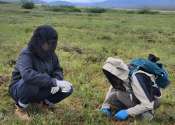Global Change Biology exists to promote understanding of the interface between all aspects of current environmental change that affects a substantial part of the globe and biological systems. Studies must concern biological systems, regardless of whether they are aquatic or terrestrial, and managed or natural environments. Both biological responses and feedbacks to change are included, and may be considered at any level of organization from molecular to biome. Studies may employ theoretical, modeling, analytical, experimental, observational, and historical approaches and should be exploratory rather than confirmatory. GCB publishes primary research articles, technical advances, research reviews, commentaries and letters.
- Publisher
- Wiley
- Website
- http://onlinelibrary.wiley.com/journal/10.1111/(ISSN)1365-2486
- Impact factor
-
6.346
(2010)
Some content from Wikipedia,
licensed under CC BY-SA









